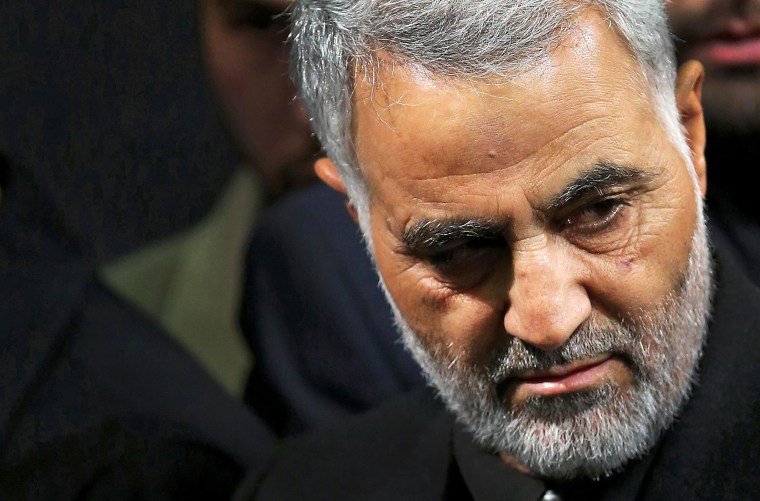As Iraqi forces attempt to root ISIS out of Saddam Hussein's hometown of Tikrit, a general known for his military might and political prowess has stepped out of the shadows to shepherd the fight.
But the man known as the "Shadow Commander" and "Dark Knight" in Western media is not Iraqi — he's a loyal commander of Iran's Revolutionary Guard.
Gen. Qassem Soleimani has been raising his profile in recent months, with Iranian outlets releasing photos of him on the battlefield in northern Iraq guiding Iraqi and Shiite militiamen in the war. While his presence is gaining more attention — including his face on T-shirts, mentions in a Shiite music video and even a parody account on Twitter — Soleimani has actually been wielding influence for over a decade, observers say.
"He’s probably the most powerful figure that is generally unknown outside Iran and the Middle East. He’s essentially Iran’s viceroy for Iraq," said Jim Phillips, Middle East analyst for conservative think tank the Heritage Foundation. "He's the puppet master controlling numerous Iranian surrogates in various countries."
That Soleimani, in his late 50s, continues to hold sway in Iraq is not surprising — despite Iraq and Iran being historic arch-enemies, Phillips added. Soleimani and Iranian leaders were bitter ideological foes with Saddam, undermining the late dictator's control and supporting his overthrow.
"His organization is drenched in American blood."
However, Iran now favors the replacement Shiite-led government in Baghdad, which remains threatened by the Sunni extremists and jihadist militants who make up ISIS.
But while the U.S. has had a shifting attitude toward Iran in an effort to fuse a deal over its nuclear program, working with Soleimani against ISIS would be regrettable, Phillips said. Since being put in control of the Revolutionary Guard's elite Quds Force in 2000, the general's track record has reportedly included supporting Hezbollah and Syrian President Bashar Assad, and according to the Pentagon, supplying IEDs that have killed American troops in Iraq. The United Nations has imposed an asset freeze and travel ban on him, which he has flouted.
"His organization is drenched in American blood," Phillips said. "It’s infused with an anti-American philosophy and a cooperation with him or his followers would not be on a sustainable basis. The U.S. would regret it."

No matter what U.S. officials might make of Soleimani, he appears to be content as the face of the offensive in Tikrit, the city which fell under ISIS control after the insurgents rampaged through the country last June.
Foreign Policy magazine dubbed him a "silver-haired Iranian spymaster" in an October profile headlined, "The Dark Knight Rises."
"That is why we have gotten so many photos of Soleimani since last summer," Lucas said. "This is not an emergence from the shadows as much as an orchestrated effort by the Iranian regime to tell local governments and populations that they can rely on Tehran and, conversely, that they should reject U.S. intervention."
ISIS Targets and Destroys Ancient Historical Remains
MARCH 8, 201502:13
As Soleimani is held up as the "poster commander" for Iran's fight against ISIS, his ability to ensure wins against the terror network will only heighten his profile, Lucas said. Losses, however, could thrust him back behind the scenes.
For instance, Soleimani’s image took a hit after an offensive south of Damascus stalled last month.
"As the offensive started, an image of Soleimani was spread around Iranian social media which purported to show him in Daraa Province with pro-regime fighters," Lucas said. But once the fight floundered, Soleimani was nowhere to be found.
"No more images circulated," Lucas said, "and there was no reference in official state media to Soleimani's apparent visit to the front line."
#IRGC Gen. Qassem Soleimani dispatches #Iraqi forces into #Tikrit for the final phase of the operation against #IS pic.twitter.com/0DKqH6BChz
— H.Soleimani (@MashreghNews_ir) March 11, 2015



Geen opmerkingen:
Een reactie posten